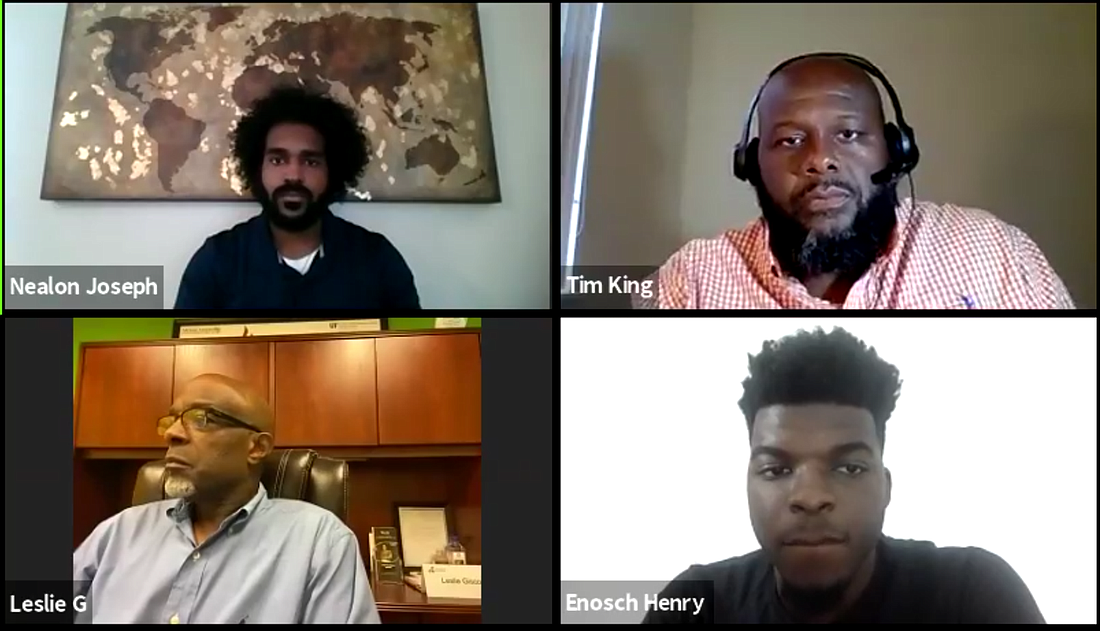- April 24, 2024
-
-
Loading

Loading

by: Brent Woronoff
Contributing Writer
While the “Uncomfortable Conversations” series concluded on July 2, the panel participants expressed hope the dialogue will continue.
Flagler County School Board Vice Chair Colleen Conklin spearheaded the series on race relations which she moderated with Tim King, the former director of special education for Flagler County.
The Zoom discussions, which were also streamed on Facebook Live, completed a three-week run with the Part 3 conversation focusing on “Creating Solutions."
"Our country is going through an awful lot right now, and, at times, we’ve seemed to lose our way in having a civil discourse to grow and learn from each other,” Conklin said early in the July 2 discussion. "The idea is to share perspectives through a deeper dive into what is happening in our country and to look at some solutions.”
Each of the three discussions featured a different panel joining Conklin and King. The Part 3 panelists were Nealon Joseph, a Flagler County emergency management planner and 10-year U.S. Air Force veteran; John Rogers, the vice mayor of Bunnell and a youth mentor; Enosch Henry, a recent Flagler Palm Coast High School graduate; Leslie Giscombe, a longtime Palm Coast resident and CEO of the African American Entrepreneurs Association; and Ken Bryan, a Flagler Beach commissioner, former St. Johns County commissioner and retired assistant director of payroll and accounting at the U.S. Department of Justice.
Carmen Gray, founder of the LLC (Long Live Curtis): Rise Above the Violence nonprofit, was also scheduled to be on the panel but had to miss the event.
The panelists discussed why conversations on race relations are difficult, the history of economic inequality and systemic bias and whether communities would be better served if some law enforcement funding was reallocated to other services.
Joseph pointed out a lack of empathy which he said comes from a lack of understanding that can thwart meaningful conversations.
“People have a tendency to listen to respond rather than to listen to understand,” he said. “Without that empathy so much gets lost.”
Bryan, who is the first African American to run for and win a spot on the Flagler Beach Commission, related a candid conversation he had with a white friend that began with the issue of removing Confederate statues. The friend eventually asked Bryan why he found Confederate flags offensive.
“I look at the history,” Bryan said. “And every time I saw a Klan meeting or something like this there was always a Confederate flag. That’s why I have my particular feelings because there’s always some inner fear I have in connection with that.”
Henry said a lot of people don’t understand the Black Lives Matter protests because they don’t understand the history.
“Our education system sugarcoats atrocities that happened,” he said.
The panelists discussed a history of redlining in which banks and local governments discriminate against inner-city neighborhoods.
“The politicians don’t have the answers. It’s up to us to make this country better for our kids and our grandkids.”
JOHN ROGERS, Bunnell city commissioner
“So many social issues have an economic base,” Giscombe said, noting how home loans and small business loans have often been unavailable to African Americans.
“Data shows if more economic opportunities were open to minorities, it would reduce crime,” he said. “So many other social issues have an economic base to it.”
Bryan said in every city and county budget discussion he’s been involved in the elephant in the room is police and fire department funding.
Joseph, who has a law enforcement background, said he doesn’t agree fully with defunding law enforcement, but said police are asked to deal with too many different situations.
“I do think we need to allocate additional resources to social workers and take some of the weight and the strain of public service off law enforcement’s hands … It’s not fair to them,” he said.
Joseph also said police misconduct investigations should be delegated to third-party agencies.
“We need to ban internal review of misconduct,” he said. “Things get swept under the rug. There’s mistrust of law enforcement because you allow that to happen.”